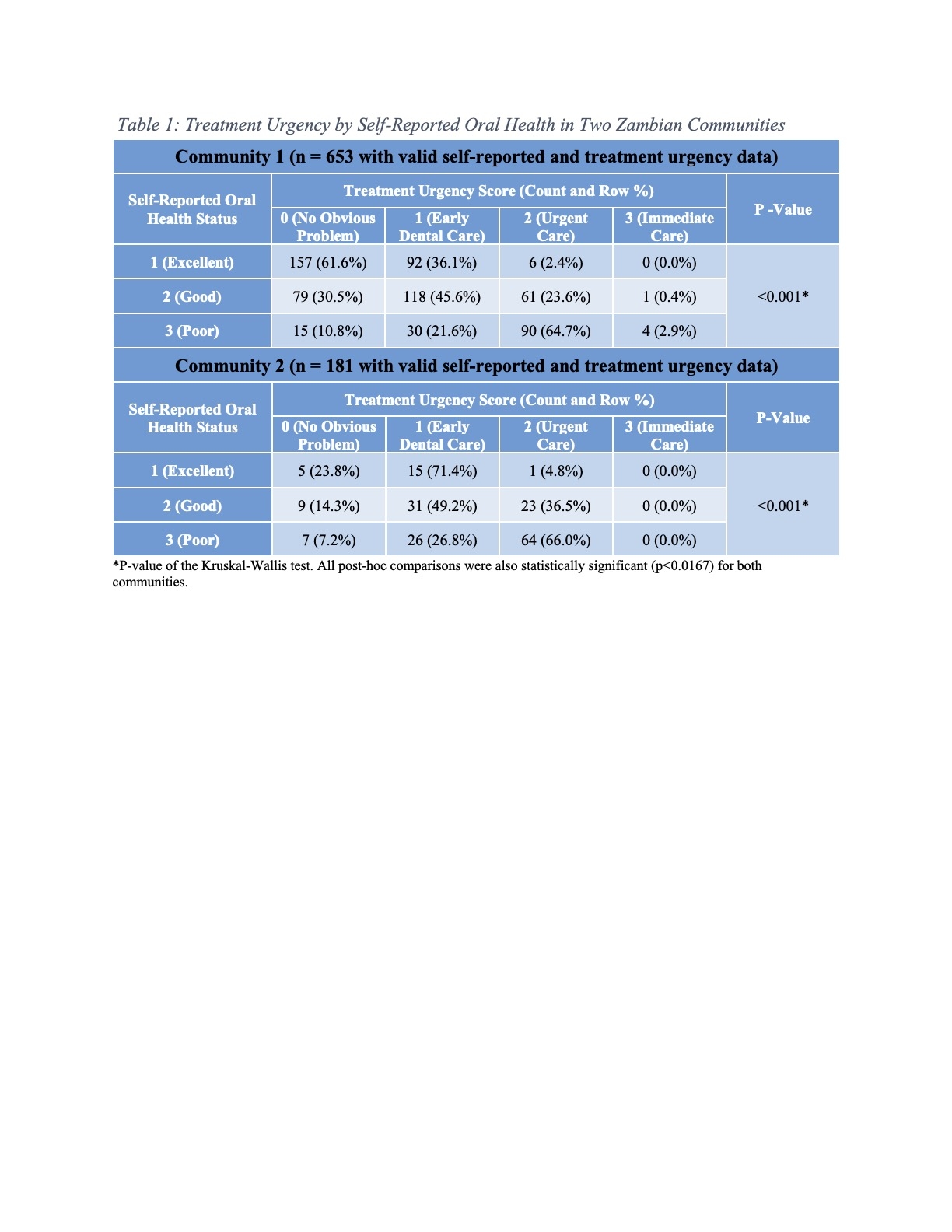IADR Abstract Archives
A Retrospective Analysis of the Oral Health Status in Zambia
Objectives: This study aims to explore the association of self-reported oral health status and an assigned WHO treatment urgency score for two under resourced rural communities in Zambia.
Methods: Data were obtained from patient dental screenings conducted in July-August 2018. Deidentified data were entered into Excel. For each site the association between treatment urgency scores (0 = no obvious problem; 1 = early dental care required; 2 = urgent care required; 3 = in need of immediate care) and self-reported oral health (1 = excellent; 2 = good; 3 = poor) was assessed using the Kruskal-Wallis test and Dunn’s test with Bonferroni correction for post-hoc comparisons. Additional analyses converted the treatment urgency scores and the self-reported oral health to binary variables (treatment urgency: 0/1 or 2/3; self-reported oral health 1/2 or 3). These additional analyses compared site 1 and site 2 in terms of accuracy of self-reported oral health status. For treatment urgency score of 0 or 1, accuracy was defined as self-reported oral health status of 1 or 2; for treatment urgency score of 2 or 3, accuracy was defined as self-reported oral health status of 3. The chi-square test (or Fisher’s exact test for sparse expected cell counts) was used for the latter analyses.
Results: This study population consisted of 660 patients from Site 1 (61% female) with an age range of 1 – 79 and a mean age of 19.4 (SD ± 14.1), and 198 patients from Site 2 (43% female) with an age range of 8 – 71 and a mean age of 34.1 (SD ± 10.5).
Conclusions: In this study patient self-reported oral health status demonstrated association with assigned treatment urgency scores. When comparing between sites, a larger percentage of site 1 respondents who were assigned a lower urgency score reported their oral health status as good/ excellent. Conversely, a larger percentage of site 2 respondents who were assigned a higher urgency score reported their oral health status as poor.This information is easily collected and suggests a potential method to assist in community oral health assessments. Future directions may include developing a modified treatment urgency score that more comprehensibly reflects self-perceived oral health needs.
Methods: Data were obtained from patient dental screenings conducted in July-August 2018. Deidentified data were entered into Excel. For each site the association between treatment urgency scores (0 = no obvious problem; 1 = early dental care required; 2 = urgent care required; 3 = in need of immediate care) and self-reported oral health (1 = excellent; 2 = good; 3 = poor) was assessed using the Kruskal-Wallis test and Dunn’s test with Bonferroni correction for post-hoc comparisons. Additional analyses converted the treatment urgency scores and the self-reported oral health to binary variables (treatment urgency: 0/1 or 2/3; self-reported oral health 1/2 or 3). These additional analyses compared site 1 and site 2 in terms of accuracy of self-reported oral health status. For treatment urgency score of 0 or 1, accuracy was defined as self-reported oral health status of 1 or 2; for treatment urgency score of 2 or 3, accuracy was defined as self-reported oral health status of 3. The chi-square test (or Fisher’s exact test for sparse expected cell counts) was used for the latter analyses.
Results: This study population consisted of 660 patients from Site 1 (61% female) with an age range of 1 – 79 and a mean age of 19.4 (SD ± 14.1), and 198 patients from Site 2 (43% female) with an age range of 8 – 71 and a mean age of 34.1 (SD ± 10.5).
Conclusions: In this study patient self-reported oral health status demonstrated association with assigned treatment urgency scores. When comparing between sites, a larger percentage of site 1 respondents who were assigned a lower urgency score reported their oral health status as good/ excellent. Conversely, a larger percentage of site 2 respondents who were assigned a higher urgency score reported their oral health status as poor.This information is easily collected and suggests a potential method to assist in community oral health assessments. Future directions may include developing a modified treatment urgency score that more comprehensibly reflects self-perceived oral health needs.

